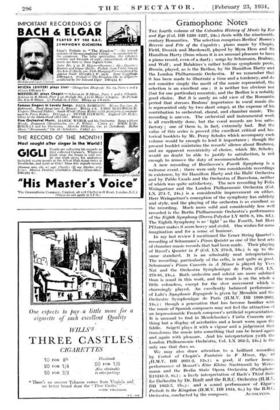Gramophone Notes
THE fourth volume of the Columbia History of Music by Ear and Eye (Col. DB 1280-1237, 24s.) deals' with the nineteenth. century Romantics. The selection, comprises Berlioz' Romeo's Reverie and Fete of the Capulets ; piano music by ChOpin, Field, Dvorak and. Maedowell, played by Myra Hess and Sir Hamilton Harty (from whom it is an unusual pleasure to have a piano 'record, even of a duet) ; songs by Schumann, Brahms, and Wolf ; and Balakirev's rathei tedious symphOnic poem, Russia, played, as is the Berlioz, by Sir Hamilton Harty and the London Philharmonic Orchestra. If we remember that it has been made to illustrate a time and a tendency, and do not consider simply the merit of the music represented, the selection is an excellent one ; it is neither too obvioui nor (but for one particular) eccentric, and the Berlioz is a notably good choice. But it is surely an odd view of the Romantic period that stresses Brahms' importance in vocal music (he is represented only by two short songs), at the expense of his contribution to orchestral, choral, and .chainber music. The recording is uneven. The orchestral- and instrumental work is all excellently done, but the vocal records are less satis- factory ; one of them is, m .fact, extremely bad. But the value of this series is proved (the excellent, critical and his- torical booklets by Mr. Percy Scholes which accompany each volume would be enough to lend it importance ;i though the present booklet maintains the records' silence about Brahms), and an apparent eccentricity of choice, which Mr. Scholes_ would no doubt be able to justify to satisfaction, is not enough to remove the duty of recommendation.
A new recording of Beethoven's Fourth Symphony is a welcome event ; there were only two considerable recordings in existence, by Sir Hamilton Marty and the Halle Orchestra and by Pablo Casals and the Orchestra of Barcelona, neither of which was quite satisfactory. The new recording by Felix Weingartner and the London Philharmonic Orchestra (Col. LX 274-7, 24s.) is a considerable improvement on either. Herr-Weingartner's conception of the symphony.has subtlety_ and style, and the playing of the orchestra is as excellent as the recording. Much more solid and considerably less well recorded is the Berlin Philharmonic Orchestra's performance of the Eighth Symphony (Decca-Polydor LY 6076-8, 10s. 6d.). The Eighth Symphony is as ' light' as the Fourth, but Herr Pfitzner makes it seem heavy and stolid. One wishes for some imagination and for a sense of huniour. - In my last review I mentioned the' Letter String Quartet's recording of Schumann's Piano Quintet as one of the best sets of chamber music records that had been made. - Their playing of Ravel's Quartet in F (Col: LX 270-3, 24s.) is up to the same standard. It is an admirably neat interpretation. The recording, particularly of the Cello, is not quite as 'good. Schumann's Piano Concerto in A Minor is played by Yves Nat and the Orchestra Symplionique de Paris (Col. LX. 2-78-81, 24s.). Both orchestra and soloist' are more subdued than is usual in this work, and the result is on the whole a little colourless, except for the slow movement which is charmingly played. An excellently bakineed performance of Lalo's Symphonie Espagnole is given by Menuhin'arid" the Orchestra Symphonique de Paris (H.M.V. DB 1999-2002, 24s.) : though a generation that has become -familiar--with the music of Spanish composers may not feel the attraction of an impressionable French composer's artificial representation. It is unusual to find in .Mendelssohn's Violin Conterto any- thing but a display of acrobatics and a heart worn apon the fiddle. Szigeti plays it with a vigour- and a judgernent that transforms the music into something that can be heard;again and again with pleasure. „And his interpretation ,(with the London Philharmonic Orchestra, Col. LX 262-5, 24s.) is the only one that does so. We may also draw attention to a brilliant recording by Cortot of Chopin's Fantaisie in F Minor, Op.'. 49 (H.M.V. DB 2031-2, I2s.) ; a good, if rather heavy, performance of Mozart's Eine Kleine Nachtmusik by Weiss- mann and the Berlin State Opera Orchestra (ParldPhOne E11241-2, 8s.) ; a lively interpretation of Bach's Third Suite
fOr Orchestra by Dr. BRIM and the B.B.c. Orchestra (H.M.V.
DB` 19'63-3, As.) ; • and a- sound p6rformance:tOf -Elgar's 'Prelude to the Kingdom (H.M.V. DB 1934, 6s.) by the B.B.C.
Orchestra, conducted by the composer. Atrrovircus.
















































 Previous page
Previous page